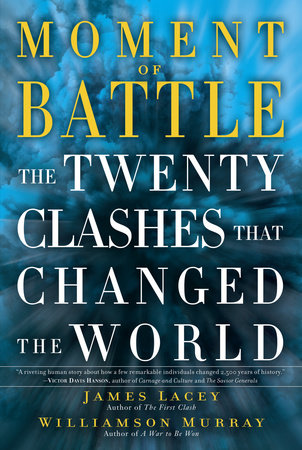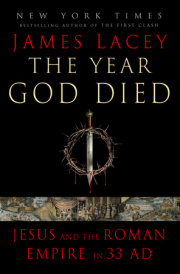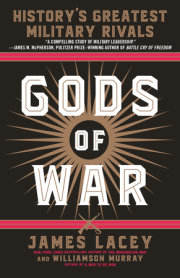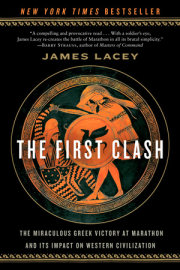Marathon
Athens Saves Western Civilization
490 b.c.
Twenty-five hundred years ago, ten thousand Athenian hoplites stood against the full might of the Persian Empire. But rather than meekly await the approach of the Persian horde, the Athenians attacked. As they surged forward, they shouted their fierce war cry: Alleee! To the vast host of waiting Persians, the Athenian charge was reckless to the point of insanity. How could a mere ten thousand foot soldiers hope to defeat more than three times their number of Persian veterans? But still they came on, first at a trot and then at a sprint. In another instant, the Persian line reeled under the crushing impact of Athenian heavy infantry, on whose prowess this day rested the survival of Western civilization.
The Persian Empire, founded by Cyrus the Great in mid–sixth century b.c., was the greatest empire in the ancient world until the rise of Rome. It stretched from the Indus River to the Mediterranean Sea and from the shores of the Black Sea to Egypt. Created in war, Persia maintained its empire for over two hundred years only through the mighty exertions of its powerful army. Nevertheless, just over twenty years before Marathon, a Persian army came close to disaster when the Great King, Darius, led it north of the Danube into the empty vastness of Scythia. Drawn deep into the steppes, Darius’s army was tormented by hit-and-run attacks by highly mobile foes who withdrew before any serious engagement could begin. Unable to bring the Scythians to battle, Darius wisely retreated before his army was decimated by a thousand small cuts. While Darius’s losses in the Scythian campaign were probably not as disastrous as the ancient Greek historian Herodotus claims, they were certainly substantial.
The mostly Greek cities of Ionia, which had been conquered decades before by Cyrus, witnessed the return of the defeated Persian army. Sensing weakness, they revolted. Herodotus describes the conflict as an ill-considered enterprise doomed to failure from its inception. However, as it took the Persians six years of near maximum effort to crush the revolt, one may question Herodotus’s judgment that the outcome was preordained. Still, Persian power was formidable. To meet it, Ionian envoys were sent to enlist Spartan and Athenian support. The Spartans, always reluctant to send their army far from home, refused. Athens, with closer ties to Ionia, along with Eretria sent a small force. In conjunction with its Ionian allies, this force marched on, captured, and then burned Sardis, the western capital of the Persian Empire. But when the Persians brought the full extent of their military power to bear, the Athenians beat a hasty retreat across the Aegean. The retreat came too late to avoid Darius’s undying enmity. Informed that the Athenians had participated in the burning of one of his cities, Darius inquired about them. According to Herodotus, who likely inserted the name of a god familiar to his Greek audience, after being told, Darius
took a bow, set the arrow on its string, and shot the arrow towards the heavens. As it flew high into the air, he said, “Zeus let it be granted to me to punish the Athenians.” After saying this, he appointed one of his attendants to repeat to him three times whenever his dinner was served: “My lord, remember the Athenians.”
After half a dozen years of war, Ionia succumbed. Darius, ostensibly having dined nightly contemplating revenge, was now free to turn his full attention to Greece. All along the empire’s coasts, ports were alive with shipbuilding activities, for Darius had ordered the construction of a great fleet, including special transports for his cavalry. In tandem with this construction, Persia’s greatest general, Datis, began gathering the battle-hardened veterans of the Ionian revolt. As this irresistible force assembled, the Great King sent envoys to demand tokens of submission from the Greeks.
Many submitted and sent back earth and water—the sign of submission. Sparta and Athens killed the Persian envoys. For them, it would be war.
The Persian Onslaught
After subduing a number of Aegean islands, including Eretria, the Persian army landed at Marathon in August 490 b.c. Datis chose the site for a number of reasons. Probably the most important was the advice of Hippias, a deposed Athenian tyrant. Hippias was now near eighty and making a final bid to regain power. He surely had memories of landing on this same coast when his father, Pisistratus, made a similar military bid for power in Athens. At that time, the hill people had rallied to his father’s cause and joined him on his triumphal march into Athens. No doubt Hippias expected a comparable welcome on this occasion and promised as much to the Persians.
The plain of Marathon may have seemed a safe landing site, and it did provide a secure harbor. However, it had one serious disadvantage. There was only one exit from the plain suitable for an army’s rapid movement. Moreover, rather than seizing that exit and marching immediately on Athens, the Persians tarried on the coastal plain for an extended period. How long they lingered is uncertain, but it was long enough to allow the Athenians to mass their hoplites on the only practicable outlet from the plain. It is almost inconceivable that the Athenians would have not strongly outposted this exit, as it had been the road used by the last successful invader of Attica—Pisistratus. The most likely reason the Persians did not march off the Marathon plain, therefore, was that there were several hundred determined Athenian hoplites standing behind a fortified wall across the southern road. They could not have held this Thermopylae-like position indefinitely, but they did not have to. By the time the Persians had assembled sufficient forces to be certain of overrunning the Greek position, the rest of the Athenian army had arrived.
At the same time the main Athenian army was marching to Marathon, the Athenians had sent one of their runners, Pheidippides, to Sparta to enlist the support of the finest army in Greece. The Spartans would have been under no illusion as to their eventual fate if Athens fell, so they resolved to help. Unfortunately for Athens, however, they were celebrating one of their many religious festivals and refused to march until the full moon.
The Athenian vanguard would have arrived at Marathon in less than half a day after setting out and was probably there before sunset. From the hills, they watched over thirty-five thousand Persians deploy across the plain, with tens of thousands more sailors lounging near the shore, preparing an evening meal. One wonders if the clever old commander of the Athenian army, Callimachus, was pleased as he surveyed the ground. He had reason to be, as the Persians had placed themselves in a bottle, and he and his army were the cork.
Datis’s lack of energy remains inexplicable, as he needed to make relatively quick work of the Athenians before dwindling supplies forced an ignominious Persian withdrawal. Callimachus knew this, of course, so one may reasonably picture him smiling as he considered the advantages with which Datis had presented him. If the Persians advanced for a decisive fight, they would find his army arrayed in a fortified position, on ground of his choosing. If Datis ordered a withdrawal, there would be a moment when they would have some troops loaded and others milling on shore. In that moment of vulnerability, Callimachus would order the Athenian phalanx forward. In the meantime, the Athenians could train, prepare, and await the Spartans.
Upon arrival at the base of the plain, the Athenians made camp within the Sanctuary of Herakles. Here one thousand Plataean hoplites joined them. The site the Athenians had chosen was a strong defensive position. The sanctuary possessed an extensive grove, and at the time the surrounding area was still heavily wooded. Taken as a whole, the site provided excellent protection against cavalry and was easily defensible against infantry. Before the Athenians stretched the Marathon plain and the Persian army. All around the plain were hills of sufficient size to hem the Persians in, even if they were not strongly outposted with Athenian hoplites. The Chardra River (actually a large stream) bisected the plain, while the northern half was dominated by a great marsh, almost impassable by any significant force. At the northern edge of the marsh, the Kynosoura Peninsula extended at ninety degrees from the beach, providing a perfect shelter for the Persian fleet beached along a narrow strip of sand between the sea and the great marsh. Between the marsh and the Athenian positions the balance of the plain was almost barren, with some sparse tree growth at scattered points.
Herodotus tells us of the Athenians’ arrival at Marathon but leaves us guessing as to what transpired immediately afterward. We do know that several days went by without either side engaging in combat. It would seem that the only notable event during this initial period was a debate among the ten tribal generals and Callimachus, the overall Athenian commander, or polemarch, on the advisability of attacking. In Herodotus’s account, each of the ten Athenian generals held command for one day on a rotating basis. As far as he was concerned, Callimachus’s role as polemarch was mostly honorary and he had no more authority than any of the other generals.
Herodotus relates the dispute among these generals, stating: “The Athenian generals were divided in their opinions: some against joining battle, thinking their numbers were too few to engage the forces of the Medes, while others, including Miltiades, urged that they fight.” The ten generals remained evenly divided, so Miltiades asked Callimachus to make the tie-breaking vote. Herodotus has him do this through a fine piece of oratory that convinced Callimachus to vote for battle:
It is now up to you, Callimachus, whether you will reduce Athens to slavery or ensure its freedom. . . . If you add your vote for my proposal, your ancestral land can be free and your city the first of Greek cities.
After this, the four generals who had supported Miltiades handed over to him the days they were to command the army so he could attack when he pleased. Miltiades accepted the extra command days, but Herodotus reports that he refused to attack until it was his day to command.
As for Datis, he could not wait any longer. After five days he was out of food, and the stench of rotting animal flesh and the waste of more than sixty thousand men were making conditions within the camp intolerable. Datis no doubt considered attacking the Greek position, but it must have been a daunting prospect. Every day he could see the hoplites assembled in front of their camp, their shields glistening and spears bristling, daring him to attack. But as he studied the ten thousand disciplined hoplites arrayed with thousands of light troops crowded behind them, he always thought better of it. Without a large body of reliable heavy infantry, he simply had no way of pushing the Greeks out of their fortifications.
With no other options, Datis gave the orders for the next day—prepare to break camp and return to the ships. It was the most dangerous operation conceivable, one that invited attack. It would take all night to break camp and move the ships into place. The job was made more difficult by the necessity of hiding these preparations from the Athenians. From past experience, Datis knew that getting the cavalry on board ship was the most difficult task ahead, so they would have to board before daybreak, as the rest of the army stood guard. If that went well, he would collapse his perimeter back toward the narrow strip of beach where the marsh protected one flank and the ocean the other. Here his elite Persians and Saka (elite Scythian troops, usually cavalry) could hold the line, protected by thousands of archers, while the rest of the army boarded ship. As Datis studied the Athenian line that the Great King had ordered destroyed, he must have thought one more time, If only the Athenians would attack. One must always be careful what one asks for.
That night, the Athenians heard unusual sounds coming from the Persian camp. Callimachus and Miltiades must have guessed what was happening, but they needed to be sure. They sent out spies, and soon enough confirmation came back: The Persians were preparing to depart. The Greek generals understood that they must not allow the Persians to leave with their strength intact. The next actions of such a force would be unpredictable and dangerous, as the Persians had a number of options available to them, none of them pleasant from the Athenian perspective. They might sail north to Thebes, never a friend to Athens, which had offered the requisite pledges of submission to Darius. From there, they could have enlisted Theban hoplites to provide the heavy infantry they lacked and together march on Athens. Alternatively, they could land elsewhere and march on Athens before the Athenian army could assemble to counter them; or they could attack any number of vulnerable points along the coast to scour Attica with damaging raids. Even more dangerous, they might find common cause with Aegina, Athens’s perennial nearby enemy, and winter on that island, recouping their strength for another descent on Attica the following year. Even joining with Argos and removing the Spartan threat was a possibility. Considering all these scenarios, it was clear to Callimachus that if Athens was ultimately to survive, the Persian force needed to be severely damaged while still on the shores of Marathon. Athens could not keep its men under arms forever. It was now or never.
Copyright © 2013 by Jim Lacey. All rights reserved. No part of this excerpt may be reproduced or reprinted without permission in writing from the publisher.









